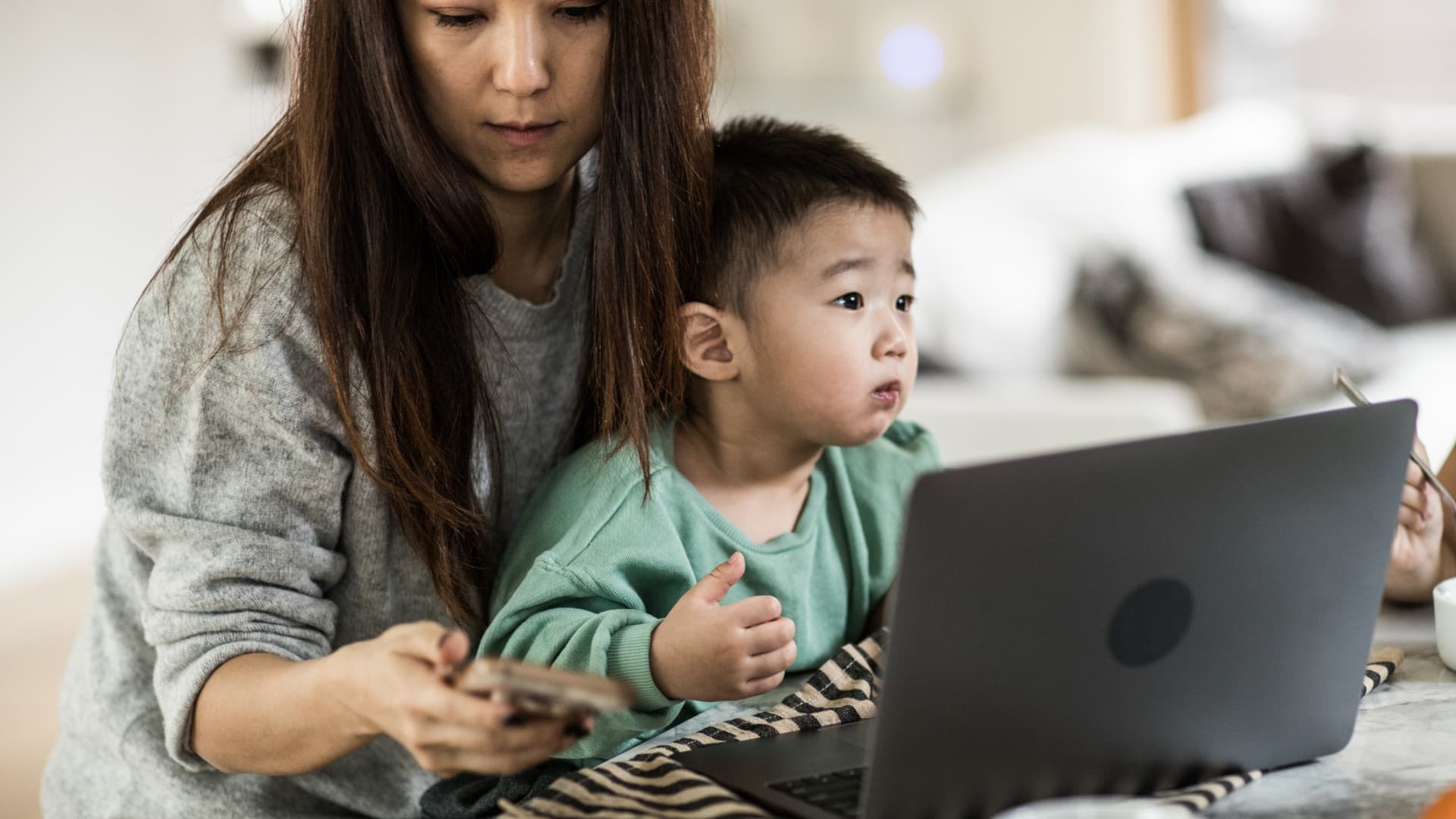

Single mom Jacalyn Shirley feels like she is constantly treading water.
When the coronavirus pandemic hit in the spring, the 36-year-old was suddenly faced with three children at home and virtual schooling. Then in May, she lost her job at a finance company.
To make matters worse, when she was offered a job at a bank in June, she had to turn it down due to lack of childcare. Divorced from her children's father, she has custody of the kids (ages 4, 6, and 14) 75% of the time. When the extra $600 in federal employment benefits ran out, things got really tough.
"It was immediately dire," said Shirley, who lives in Ocean Beach, California.
She was bringing in less than her rent. With no emergency savings, she had to immediately cut costs and find help. She dumped her COBRA coverage and got Medi-Cal, low-cost, income-based insurance coverage through the state. Shirley also qualified for food assistance through CalFresh.
"Each month, I'm able to get the bills paid one way or another," she said.
Money Report
Her experience isn't unique, as 23%, of U.S. children under the age of 18 live with one parent and no other adults, according to Pew Research Center.
Meanwhile, studies show that women have been hit disproportionately during the crisis. Of the more than 1 million workers over the age of 20 who left the workforce in September, 865,000 of them were women, according to the National Women's Law Center. While jobs are being added back, women are still behind in those gains, the organization found. There were still more than 2 million fewer women in the labor force in October than were in February.
"A lot of women are feeling backed into a corner and really struggling both financially with what the virus is doing but also personally," said certified financial planner Stacy Francis, president and CEO of New-York based Francis Financial, which is dedicated to serving women.
"This is hard for all of us but for single parents in particular, it's really devastating."
Facing burnout
Shirley decided to take matters into her own hands and start her own business, a mortgage brokerage company called Harbor Funding.
It gives her the flexibility since school is back in session, but not necessarily in person, this fall. Her 4-year-old is back in pre-school and her special-needs 14-year old recently started in-person learning two days a week.
More from Invest in You:
Blended families already had unique issues. Then the pandemic hit
Expecting a baby? Make these financial moves now
How to navigate uncomfortable money matters with your family
Shirley's first-grade daughter is all virtual but is part of a pod, where parents rotate teaching one day a week. However, her daughter — typically an excellent student — had trouble with the live, online meetings, so Shirley switched her to a homeschool curriculum, which has cost more than $600 so far.
Shirley teaches her at night and then sends her to the pod school with work to do.
"I'm burned out in a way I've never experienced before," she said.
If her business doesn't take off, she'll be right back where she started.
Ask for help … or give it

If you are struggling, you don't have to go it alone.
"Don't be a hero," said certified financial planner Holly Mazzocca, a wealth advisor with Bartlett Wealth Management, based in Cincinnati. "Ask for help. Rely on community in a way that you feel safe doing so."
It's also about triaging.
"When the mask drops down from the airplane in the event of an emergency, you put that mask on first and then put the mask on you child," said Francis, a member of the CNBC Financial Advisor Council.
"That is truly a necessity for taking care of us both personally and professionally."
If you see someone else going through a hard time, even if they don't tell you about it, step in and help as much as you can, Francis advises. That can mean dropping off a lasagna or having their kids over for dinner and a game night, or even asking that person to go for a walk, she said.
Employers can also recognize the stress their employees are feeling and give them more flexibility, support and understanding to navigate this time, Francis added.
Make sure worst-case scenario is covered
While it can be hard to think about, single parents should make sure their estate plans are in place, especially when it comes to who will be the guardian for their children.
"Make sure that somebody knows your intentions and that you write it down," Mazzocca said.
If you have the resources, hire a lawyer. At the very least go online and make a will, as well as a health-care and financial power of attorney, she noted.
Cut expenses and save
It's hard to save when there are so many demands on your resources. Yet having money saved can help you navigate the next emergency.
"The simple step of reminding yourself of why we are saving is a huge step in helping us reach these saving goals," Mazzocca said.
"It is about what that means in terms of providing stability and opportunity for your family."
Ideally, having enough money to cover three to six months of expenses is ideal. If you have income coming in, see where you may be overspending or where you can cut back. Then put that money into savings.
That's what 41-year-old Misty Brannon is doing. Single mom to a 17-year-old boy, she works as a risk analyst at a Houston-based energy company.
"The powerful thing that came out of this is being able to sit down and see what our financial situation was," she said.
Brannon made adjustments in her spending once the pandemic hit and has been able to save about two to three months of expenses. Her goal is to reach six months. It's a far cry from when she filed for medical bankruptcy after her son's premature birth.
"I raised him on my own," Brannon said. "I had to learn everything the hard way."
She's now teaching her son about managing his money and creating savings. She's also focusing on improving her own financial future. She's enrolled in an online MBA program and is studying for the CPA exam.
If you can't save now
If you have no income coming in, you are doing your best just to survive day to day. Do what's necessary, whether it is cutting expenses down to the bare minimum, moving in with family or seeking government assistance.
Once you recover, you can start thinking about building up your emergency fund.
"So much of the worry and anxiety right now is about trying to take care of our children, but it is being compounded by money worries, anxiety and uncertainty about the future," Francis said.
The more you can build up to the ideal savings rate of 15% to 20% of our income, the better you'll be long-term.
"It is a huge number, but it is something each one of us can work toward," she said.
SIGN UP: Money 101 is an 8-week learning course to financial freedom, delivered weekly to your inbox.
CHECK OUT: I have 9 side hustles and bring in up to $4,000 each month: Here's my best advice via Grow with Acorns+CNBC.
Disclosure: NBCUniversal and Comcast Ventures are investors in Acorns.






